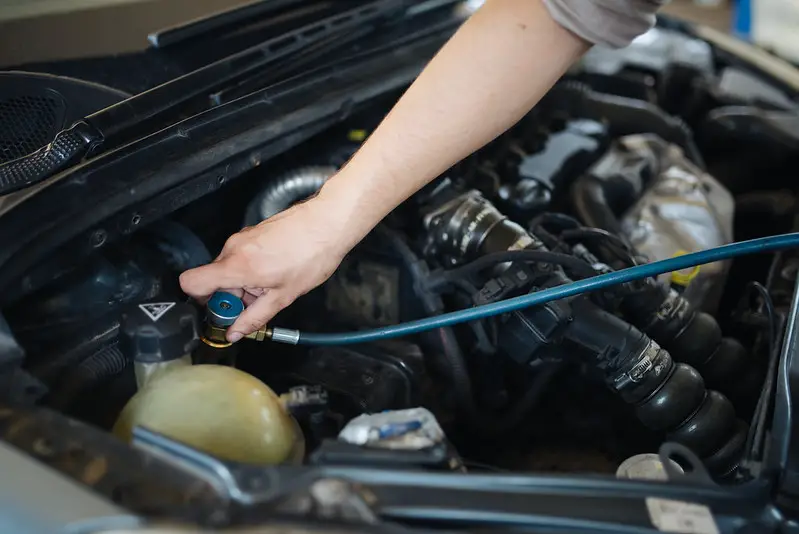If you suspect a car AC compressor leaking issue in your vehicle, addressing it swiftly is crucial. In this comprehensive guide, we’ll explain everything you need to know, step by step, to identify and fix a leaking AC compressor, equipping you with the knowledge to maintain the comfort and functionality of your vehicle, even with no prior experience.

Table of Contents
Identifying Car AC Compressor Leaking
Early identification of a car AC compressor leaking can help in averting a potential crisis. To successfully identify a leak, you need to be aware of the signs that point to this problem:
Reduced Cooling Efficiency: If your car isn’t cooling as well as it used to, this might be a sign of a leak. A well-functioning AC system should cool the car rapidly.
Unpleasant Smell: A car AC system leak can sometimes produce a musty smell, indicative of a refrigerant leak.
Visible Signs: Check for visible signs such as oil stains or green fluid under your car, which could be the refrigerant fluid.
Noises: Unusual sounds like hissing or bubbling from the AC unit can be a telltale sign of a leak.
Physical inspection is essential; therefore, regularly check the area around the AC compressor for signs of leakage. Remember to also listen keenly to any irregular sounds when the AC is running.
Tools You Will Need
To adequately address a leaking AC compressor, you must arm yourself with some essential tools. These include a flashlight for better visibility during the inspection, gloves to protect your hands, protective eyewear to shield your eyes, and a leak detector kit, which is essential in pinpointing the exact source of the leak.
You can get this 4 ALLTECH WJL-6000 pro Freon Refrigerant Halogen AC Leak Detector from Amazon now!
Equipping yourself with the right tools will facilitate a smoother and safer repair process.
Fixing Car AC Compressor Leaking
Once you have identified the leak, moving to the next step of fixing the issue is crucial. This involves several detailed steps which should be carried out meticulously to avoid any mistakes:
Safety First: Ensure the car is off and cool to prevent any accidents during the repair process.
Inspect the Compressor: Start by inspecting the compressor for any visible signs of damage. Sometimes the issue could be with the compressor clutch, not the compressor itself.
Replacement of Parts: Depending on the severity of the leak, you might need to replace the O-rings, seals, or in extreme cases, the entire compressor.
Professional Help: If you find yourself out of depth at any point, don’t hesitate to seek professional assistance to avoid exacerbating the problem.
Remember that fixing a leaking compressor is a technical task. If unsure, always refer to your vehicle’s manual or consult a professional technician.
Check out these other articles…
How to Tell if Your AC Compressor Needs Oil: 4 Easy Methods
Symptoms of a Bad AC Compressor Relay: Easy Guide
AC Compressor Clutch On and Off: What You Need to Know
When to Replace Car AC Compressor: Your Comprehensive 411 Guide
Chevy Cruze AC Compressor Noise: How to Identify & Fix
Preventing Future Leaks
To prevent future occurrences of leaks, adopt a proactive approach by:
Regular Maintenance: Schedule regular check-ups for your car’s AC system to spot any potential issues early on.
Refrigerant Levels: Ensure that the refrigerant levels are checked during each maintenance cycle and are refilled to the optimum levels as required.
Use Quality Parts: Always opt for quality parts during replacement to enhance the longevity and performance of the AC system.
Preventing leaks not only saves you from future discomfort but also shields you from potentially high costs associated with major repairs. Regular maintenance is the key to a healthy AC system.